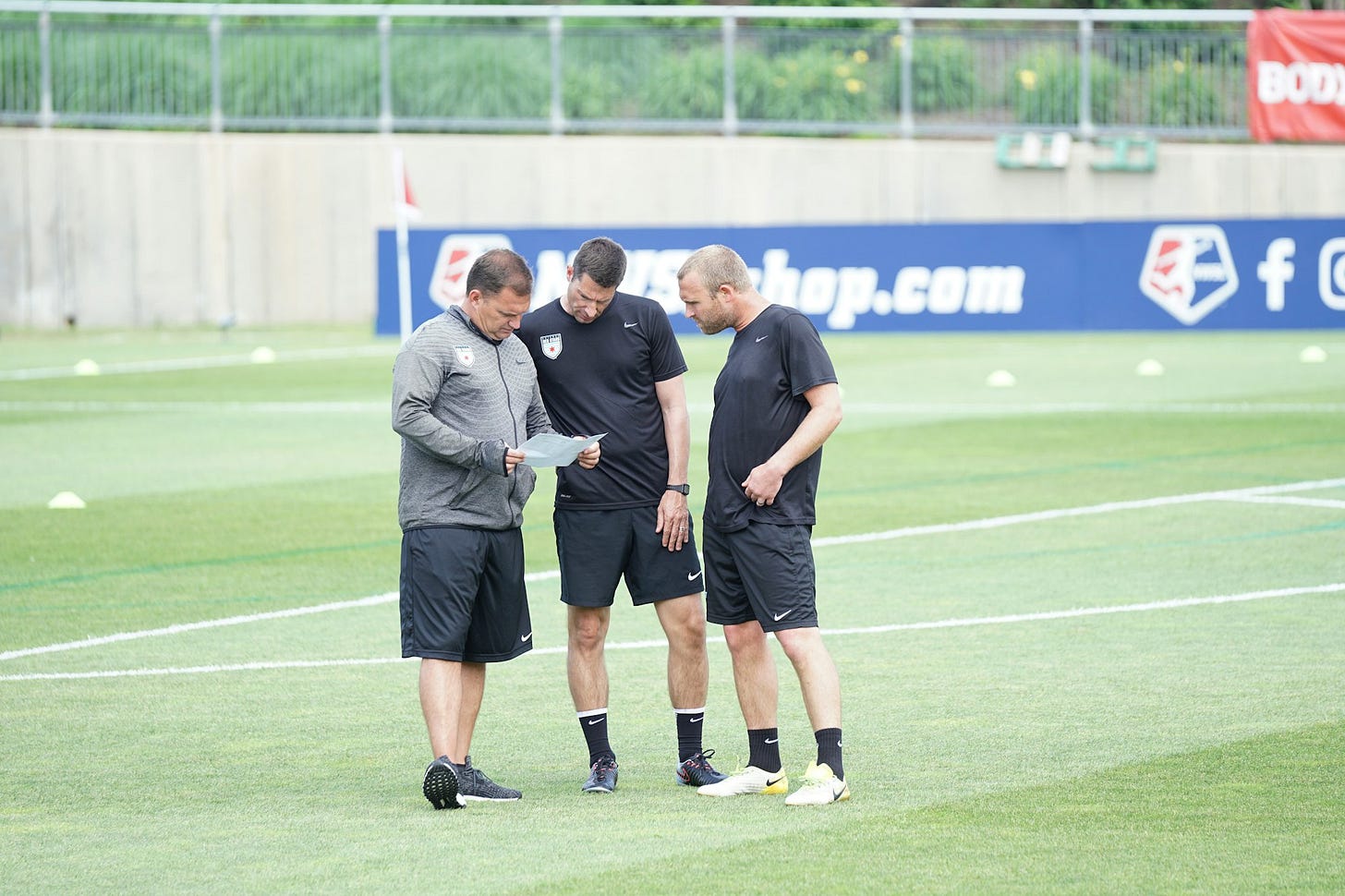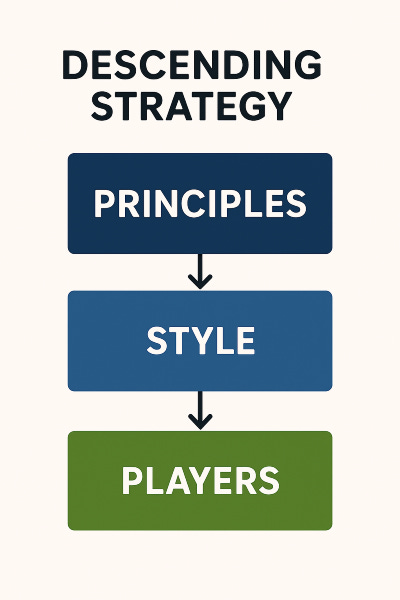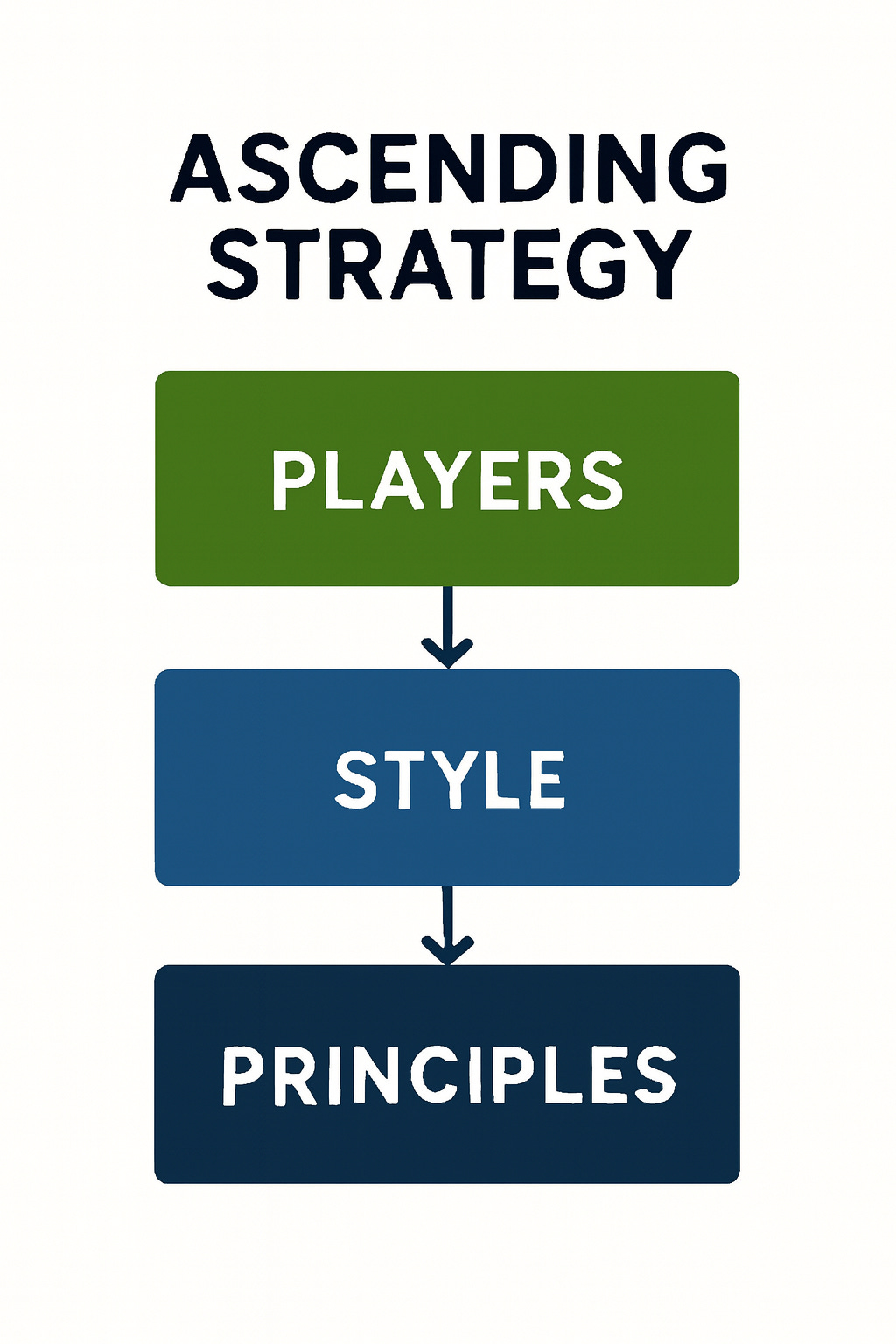Your Club's Coach Might be Sacrificing Talent for Stylistic or Tactical Fit
An essay on the style-talent tensions that manifest when building a team.

In What Should We Expect from Head Coaches?, Joel responds to his views on MRKT insights' essay - Hiring Head Coaches - Why Style Matters. He argues against coaches remaining static and relying on style to identify, platform, and develop players. For these coaches, aligned profiles are more important than overall ability. He explains that this 1) compromises quality for fit and 2) carries risk for repetition elsewhere.
In his words:
"A head coach's decision to adopt an attacking style, despite their team's inability to effectively compete using such tactics, might reflect poorly on their talent ID."
"For this essay, I define Talent ID not merely as spotting capable players but as understanding which environment maximizes their abilities."
Since top clubs consider philosophical and stylistic fits when recruiting, coaches tend to lean into a style resembling that showcased by top clubs. In turn, forsaking the possibility to attain better results. Joel argues against this – that what is expected from coaches, first and foremost, is that they appreciate a player's abilities.
Furthermore, he explains, aligned but less effective players may contribute to building a stylistically fitting team, though this will be at the compromise of other more sophisticated and competent players.
He concludes with an upgraded version of MRKT insights' claim that:
"... good teams, play good football, with good players."
Joel proposes:
"[the best] teams play good football with [the best] players."
Luqman's Take
When assessing head coaches, it is most important to know how well they can platform talent available to them. Not whether they want to build from the back or press high in the opponent's half. This informs us that the coach's processes are player-centered, and thus, they are sustainable in the long term, even if sometimes results will not immediately reflect.
Considering this, recruiting a coach is not only a matter of assessing what they bring on the pitch but rather assessing fit in the necessary hallmarks.
It makes sense that to play a certain style of football, a set of players that align with said style are needed. For example, Pep Guardiola's teams have always had technically sound players that take good care of the ball. But the real matter lies not in the style a coach prefers but rather the premises from which this style is obtained.
This is because the best teams are a product of quality players, the needle-movers, best-in-the-world players. Coaches should always be humble enough to put their ideals away and focus on setting up the best conditions for their players. Ultimately, even after weeks of preparation, months of training, and millions of instructions and tactics; coaches do not play. They can only do so much.
Pep Guardiola on sticking to his football philosophy: "We won a lot, you know? A lot. Why would you change?
"I change when it's the players. When I have, for example, Bernardo [Silva] as a winger, or Leroy Sane as a winger, it's different. Bernardo has to get the ball to feet,…— City Xtra (@City_Xtra) August 30, 2025
"I change when it's the players. When I have, for example, Bernardo [Silva] as a winger, or Leroy Sane as a winger, it's different. Bernardo has to get the ball to feet, and Leroy you give the ball in behind. "
Here's another one:
Pep Guardiola: "I will not demand from Gigio [Donnarumma] to do something he's uncomfortable [with]. We're talking about the best player I've ever seen in distribution short and long in Ederson. We didn't take Gigio to do what Ederson has done. Gigio has another qualities..."
— City Xtra (@City_Xtra) September 12, 2025
The best teams are shaped by the players. Coaches adapt to their players.
In another excerpt:
"Coaches aren't necessarily required to know the best talents from other teams; a well-established network can often supplement this knowledge. However, it is crucial for any coach to possess a keen eye for identifying and utilizing the talents within their own squad effectively."
This is what Joel refers (and I allude) to in his essay as Talent ID. Might I sprinkle an extra term here: Profiling.
Coaches serve as platformers. They appreciate talent and trust that it will bloom to achieve great heights — Talent ID.
They see into a player's abilities and offer the best possible conditions for development and utilization — Profiling.
The best coaches know, understand, value, trust, and empower their players to the utmost.
It is obvious we value head coaches and probe their work because they are afforded the mandate to determine a team's pathway: who gets how many minutes, in which game, which tactics are used, against which opponent; it's these decisions that make it significant to know, as Joel says, what to expect from head coaches.
However, while reading that essay, I found myself disagreeing with some arguments.
Disagreements
After some time thinking, re-thinking, testing, and experimenting, I finally gathered enough clarity to transform the thoughts lurking in a corner of my mind into real, understandable words. Below is what culminated.
Fundamentals provide the base that sets a stage to refine principles and beliefs. A strong enough base ensures the materials atop it are laid out in a manner that allows refinement of the highest accord. This is why fundamentals are held constant. It is expected that accomplished coaches in elite professional football, via their journeys, have attained enough clarity in their principles and beliefs to have them prefer a specific way of playing. As explained in Joel's essay, a specific way of playing requires a specific set of players with aligning attributes.
How then are coaches to avoid the pitfall where they compromise quality for fit in their Talent ID?
Similar to fundamentals, coaches tend to stick to their methods. Because 1) these are a resemblance of who they are as human beings and 2) they have tested most of, if not all, of these, throughout their careers. And at reasonable success rates. This dive into preference translates into style. However, at certain clubs, this preference does not always come to fruition.
Should these coaches abandon the belief they have in their methods and opt for presumably better ones that yield?
Some Possible Ways to Solve This
Modern coaches need a contrasting perspective on specification
The general approach taken by club executives to plan the execution of day-to-day footballing matters has led coaches astray. Coaches have been engulfed in attempting to gain specification almost the same way that executives have done. That is, by defining needs and wants to gain clarity in their processes. However, such an approach might actually be of little use.
One significant expectation from coaches is that they provide authoritative organization and coordination. That is why, first and foremost, coaches should empower and platform players by providing the utmost conditions for them to thrive.
Specification in style is a product of a descending strategy: Principles —> Style —> Players. That goes in contrast to what is expected from coaches.
This, while beneficial as a macro-strategy for clubs, is detrimental to coaches. An ascending strategy might be of better use: Players —> Style —> Principles.
Here's a table comparing the two:
Strategy
Advantages
Disadvantages
Descending
• Ensures philosophical consistency across the organization
• Long-term identity building
• Easier to scale and replicate
• May limit flexibility with player selection
• Can feel rigid or dogmatic
• Slow to adapt to changing conditions
Ascending
• Maximizes current player strengths
• Fast implementation
• Adaptive to real-world constraints
• May lack cohesive identity
• Style can feel reactive or temporary
• Harder to build long-term culture
It is particularly clear that the game needs specificity. But under attentive observation, it is also true that rigid stylistic preferences among coaches are misleading and, ultimately, continuously depriving teams of quality and players of their potential.
Adaptation and Evolution are Inevitable
Fundamentals, principles, and beliefs will always remain constant as these birth a base for actionable processes. Nonetheless, no matter how strong one's beliefs, the game requires us to be able to abandon what is no longer actionable for that which is sustainable.
Coaches must possess the mental resilience to revise previous conclusions and attain new, better ones as premises for their processes. This ensures they stay ahead, remain competitive and diversify their processes.
"You have to have that resilience and leave your ego aside and your ideology aside and do what you have to do to win" 😤
Mikel Arteta explains the evolution of his Arsenal side 📈 pic.twitter.com/SrQgJ7Q8NG— Sky Sports News (@SkySportsNews) April 2, 2024
NothingDependentHinges like a bit of validation from one of the best coaches in the world to make me feel good about myself.
"You have to [adapt], sometimes because you want to adapt, sometimes because you have to adapt. And you have to have that resilience and leave your ego aside and your ideology aside and do what you have to do to win the game"
Adaptation is Dependent and Hinges on Variety
In another essay, I argue that for head coaches to concur their processes, variety is pertinent.
Therein I wrote:
"Questions on the importance of head coaches pry us to describe their main roles and, in the end, suggest the best possible pathway for them to undertake their tasks."
"It is established that coaches, among other sports professionals, need to evolve and adapt. What is not established is the extent that will effectively enable transitioning to present requisites while holding on to core principles. The answer: variety."
"Extrapolating this to the game, everyone involved needs to adapt and, consequently, evolve. Diversity is a leeway towards this."
This still holds true today.
I have found financial status to be the main determining and differentiating factor on the need for diversity (variety). The better a club's financial position the higher the leeway and the lesser the need for diversity, and vice versa.
Financially robust clubs can afford being strictly committed to a style, seldom are they required to readjust their approach with regards to competition level and resources, or lack of.
Coaches at these clubs are afforded the choice in securing individual preferences (style) as the focal point for their processes and implement a descending strategy.
So, what should we expect from head coaches?
They identify talent within their squads
They trust and appreciate talent
They platform players for the best performance
They aid minute-to-minute development
They create a culture and environment that promotes nurturing athletes
What Should We Expect from Head Coaches?
Who is The Writer?
Luqman A. Kabange is a college student at the Kibaha College of Health and Allied Sciences (KCOHAS) in Pwani, Tanzania where he studies clinical medicine.




